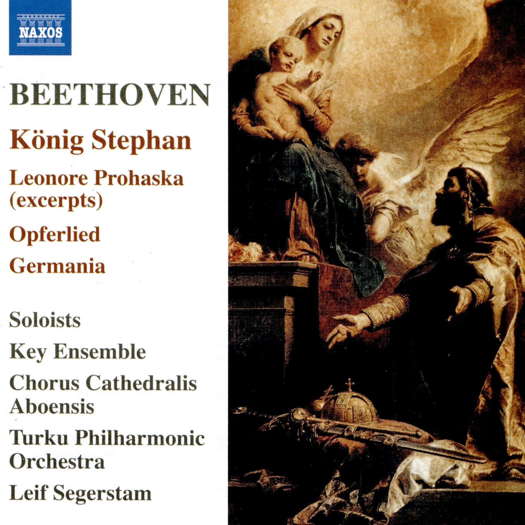 DISCUSSION: John Dante Prevedini leads a discussion about Music and the Visual World, including contributions from Celia Craig, Halida Dinova and Yekaterina Lebedeva.
DISCUSSION: John Dante Prevedini leads a discussion about Music and the Visual World, including contributions from Celia Craig, Halida Dinova and Yekaterina Lebedeva.
 SPONSORED: CD Spotlight. Well Realized - Varda Kotler and Israel Kastoriano - recommended by Geoff Pearce.
SPONSORED: CD Spotlight. Well Realized - Varda Kotler and Israel Kastoriano - recommended by Geoff Pearce.
All sponsored features >>
 VIDEO PODCAST: James Ross and Eric Fraad discuss Streaming, Downloads and CDs with Maria Nockin, Mary Mogil, David Arditti, Gerald Fenech, John Daleiden, John Dante Prevedini, Lucas Ball and Stephen Francis Vasta.
VIDEO PODCAST: James Ross and Eric Fraad discuss Streaming, Downloads and CDs with Maria Nockin, Mary Mogil, David Arditti, Gerald Fenech, John Daleiden, John Dante Prevedini, Lucas Ball and Stephen Francis Vasta.

Interesting Stuff
Beethoven's 'King Stephen' and other rare works,
appreciated by GERALD FENECH
'Finely performed and recorded, this CD is a must for all serious collectors and admirers of the great man.'
Perhaps constrained by the limitations of his childhood, Beethoven had a less positive association with the theatre than Mozart, whose carefully planned education allowed the latter to compose the greatest operas of the decade. Indeed Mozart wrote his first opera in his early teens, while Beethoven's connection with the theatre began in his mid-thirties.
Fidelio, his only opera, was a nine-year toil. Composition commenced in 1805 and the work reached its final form in 1814. His deafness made performance impossible, and his living depended solely on the sale of compositions and the acceptance of occasional commissions. Consequently, Beethoven's general link with the Viennese theatre came about largely through incidental music or songs to be inserted into the works of other composers – insertion arias.
The music to King Stephen was written at Teplitz in the summer of 1811. After a postponement, the work was first performed in February 1812 to mark the opening of a new theatre in Pest, an event of political significance. The libretto by August von Kotzebue narrates the story of King Stephen, Hungary's First Benefactor, who ushers in a new era of peace based on the Christian Faith. The rebel Gyula is opposed to this endeavour, but when he is captured the King pardons him and Gyula repents and embraces the new Faith. The story ends with the marriage of King Stephen to the maiden Gisela, followed by the placing of the golden crown, just arrived from Rome, on the King's head (done by Stephen himself) to general rejoicing.
Listen — Beethoven: Hail to our descendants! (King Stephen)
(track 23, 0:00-0:39) © 2019, 2020 Naxos Rights (Europe) Ltd :
Apart from the Overture, which is the only familiar excerpt, the music is made up of a number of very short pieces - choruses and orchestral miniatures, interspersed with several monologues and melodramas. Do not expect vintage Beethoven, but all this is very interesting stuff considering that this is music that has hardly been performed at all since its composition.
Listen — Beethoven: Victory March (King Stephen)
(track 6, 0:00-0:59) © 2019, 2020 Naxos Rights (Europe) Ltd :
In 1815 Beethoven provided contributions to Friedrich Duncker's tragedy Leonore Prohaska, cabinet secretary to the Prussian King, who fought against Napoleon in 1813 disguised as a man and whose identity was only discovered when she was mortally wounded. Among the pieces Beethoven wrote are a soldiers' chorus and a Romance with harp accompaniment, which are both included on this programme.
Listen — Beethoven: A flower blooms (Leonore Prohaska)
(track 25, 0:00-0:51) © 2019, 2020 Naxos Rights (Europe) Ltd :
Friedrich von Matthisson's poem Opferlied (Sacrificial Song), picturing a young man's prayer to Zeus to bestow upon him beauty and youth in old age, was a particular favourite of the composer. Indeed, he set the poem to music no less than four times with different combinations of singers and instruments.
Listen — Beethoven: Opferlied
(track 28, 6:25-7:16) © 2019, 2020 Naxos Rights (Europe) Ltd :
This disc also includes four other pieces: Goethe's Bundeslied (Song of Fellowship), Chorus of the Allied Princes (anon) and Treitschke's The Good News from Germania, celebrating the 1815 Congress of Vienna, and It is Accomplished for bass solo, the author's tribute to Napoleon's final defeat. Not an 'Eroica' or 'Emperor', but these appetite-whetting cameos do reveal another facet of the master's inexhaustible imagination that was hitherto neglected up to now. Finely performed and recorded, this CD is a must for all serious collectors and admirers of the great man.
Copyright © 26 April 2020
Gerald Fenech,
Gzira, Malta

CD INFORMATION - BEETHOVEN: KÖNIG STEPHAN
FURTHER INFORMATION - LUDWIG VAN BEETHOVEN


